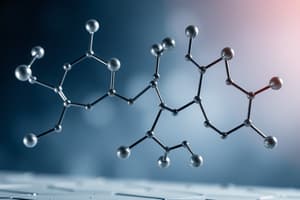Podcast
Questions and Answers
What are hydrocarbons?
What are hydrocarbons?
- Compounds consisting of hydrogen and oxygen atoms
- Compounds consisting of carbon dioxide and water molecules
- Compounds consisting of carbon and nitrogen atoms
- Compounds consisting exclusively of hydrogen and carbon atoms (correct)
What is the molecular structure of alkanes?
What is the molecular structure of alkanes?
- They have ionic bonds between carbon atoms
- They have single covalent bonds between carbon atoms (correct)
- They have no bonds between carbon atoms
- They have multiple double bonds between carbon atoms
Why is carbon considered the backbone of organic compounds?
Why is carbon considered the backbone of organic compounds?
- Due to its abundance in the Earth's atmosphere
- Because it forms stable, covalent bonds with itself and other elements (correct)
- Due to its ability to form hydrogen bonds with other elements
- Because it has strong ionic bonds with other elements
What is the special focus of the article?
What is the special focus of the article?
Which type of hydrocarbons are characterized by a pleasant odor and stable, planar molecular structure?
Which type of hydrocarbons are characterized by a pleasant odor and stable, planar molecular structure?
What is the main difference between alkanes and alkenes?
What is the main difference between alkanes and alkenes?
Which type of hydrocarbons is used to make a wide range of plastics, including polyethylene and polystyrene?
Which type of hydrocarbons is used to make a wide range of plastics, including polyethylene and polystyrene?
What makes alkynes even more reactive than alkenes?
What makes alkynes even more reactive than alkenes?
In what way do hydrocarbons contribute to air pollution and climate change?
In what way do hydrocarbons contribute to air pollution and climate change?
What causes health problems when inhaled or absorbed through the skin?
What causes health problems when inhaled or absorbed through the skin?
Study Notes
Carbon and its Compounds: A Deep Dive into Hydrocarbons
Carbon is a versatile element that forms the basis of numerous organic compounds, including hydrocarbons. Hydrocarbons are organic compounds consisting exclusively of hydrogen and carbon atoms. They are an essential part of our lives, as they are the main components of petroleum and natural gas, which are used to make fuels, lubricants, and plastics. In this article, we will delve into the world of carbon and its compounds, with a special focus on hydrocarbons.
Carbon: The Element of Life
Carbon is the fourth most abundant element in the universe and the second most abundant element in the Earth's crust. It is the backbone of all known organic compounds, including the DNA and proteins that make up living organisms. Carbon's unique ability to form stable, covalent bonds with itself and other elements makes it a versatile and essential element for life.
Hydrocarbons: The Building Blocks of Organic Chemistry
Hydrocarbons are organic compounds that consist exclusively of hydrogen and carbon atoms. They are classified into two main categories based on their molecular structure: aliphatic and aromatic hydrocarbons.
Aliphatic Hydrocarbons
Aliphatic hydrocarbons are further classified into three types:
-
Alkanes: These are saturated hydrocarbons, meaning they have no double bonds between carbon atoms. They are the simplest and most common type of hydrocarbon and include methane, ethane, propane, and butane.
-
Alkenes: These are unsaturated hydrocarbons, meaning they have one or more double bonds between carbon atoms. They are less stable than alkanes and are more reactive.
-
Alkynes: These are hydrocarbons with one or more triple bonds between carbon atoms. They are even more reactive than alkenes and are formed when alkanes are subjected to high temperatures or pressure.
Aromatic Hydrocarbons
Aromatic hydrocarbons are characterized by their distinct, pleasant odor and stable, planar molecular structure. They are formed from six-membered carbon rings, with alternating single and double bonds. Examples of aromatic hydrocarbons include benzene, toluene, and xylene.
Applications of Hydrocarbons
Hydrocarbons have numerous applications in our daily lives, including:
-
Fuels: Alkanes, such as methane and propane, are used as fuels in homes and industries. They can also be converted into gasoline, diesel, and jet fuel.
-
Lubricants: Alkanes and alkenes are used to make lubricants, such as motor oil and transmission fluid.
-
Plastics: Alkanes, alkenes, and alkynes are used to make a wide range of plastics, including polyethylene, polypropylene, and polystyrene.
-
Chemicals: Hydrocarbons are used as raw materials in the production of a wide range of chemicals, including dyes, solvents, and detergents.
Environmental and Health Concerns
Despite their numerous applications, hydrocarbons have several environmental and health concerns. For example, the burning of fossil fuels, which are derived from hydrocarbons, contributes to air pollution and climate change. Additionally, some hydrocarbons, such as benzene, are known carcinogens and can cause health problems when inhaled or absorbed through the skin.
Conclusion
Carbon and its compounds, particularly hydrocarbons, play a crucial role in our lives, from fueling our vehicles to providing the building blocks for the plastics we use every day. Understanding the properties and applications of hydrocarbons can help us make informed decisions about their use and promote sustainable practices to minimize their environmental impact.
Studying That Suits You
Use AI to generate personalized quizzes and flashcards to suit your learning preferences.
Description
Explore the world of hydrocarbons, the organic compounds consisting exclusively of hydrogen and carbon atoms. Learn about their molecular structures, applications in fuels, lubricants, plastics, and chemicals, as well as the environmental and health concerns associated with their use.




